Tax transformation trends survey
Talent reimagined
In this second report of the Tax Transformation Trends survey series, we tapped into the perspectives of 300+ tax and finance leaders with a focus on talent transformation. As companies look past the pandemic, they are asking their tax functions to play a bigger advisory role—with less resources and more responsibilities. In this era of change, leaders will need to think differently to stay ahead of the curve.
Get ready to reimagine your tax function, today.
The future of tax talent
Rethinking the work, workforce, and workplace
As companies look beyond the pandemic, they are asking their tax functions to play a bigger advisory role. Tax leaders have been asked to provide strategic counsel on emerging issues on everything from new digital business models to sustainable transformation. They need to transform their technology infrastructures to free up team capacity, operate more efficiently, and use data more effectively. Meanwhile, all this change is happening during an unprecedented global shift to remote and hybrid working. These trends have profound implications for the future of the tax function: how the work gets done, the skills that make up the workforce, and how the workplace is defined.
Click here to download the executive summary report that highlights tax leader’s strategic perspectives on tax operations, talent, and technology.
Key Insight 1: Tax work
How has the work changed?
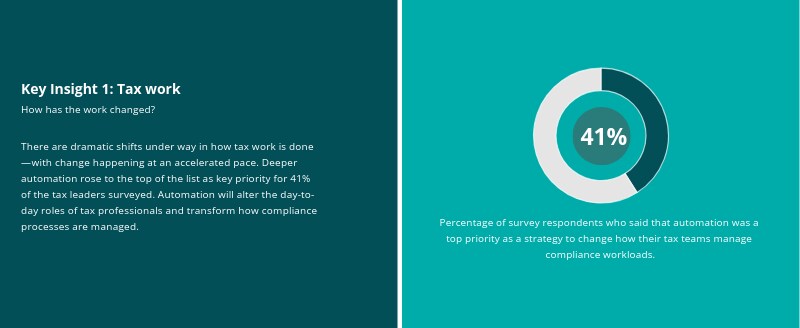
Key Insight 1: Tax work
There are dramatic shifts under way in how tax work is done—with change happening at an accelerated pace. Deeper automation rose to the top of the list as key priority for 41% of the tax leaders surveyed. Automation will alter the day-to-day roles of tax professionals and transform how compliance processes are managed.
Tax is leaving the tax department. We’re being pulled much closer into areas such as government relations and sustainability—it’s changing the balance of responsibilities for our team.
Mike Munoz, VP Tax and Treasurer, Suncor
Tax leaders are prioritizing these strategies to help their teams manage compliance workloads
Increased automation and reliance on shared service centers are the top choices for tax leaders looking to leverage lower cost resource models for routine tax compliance work.
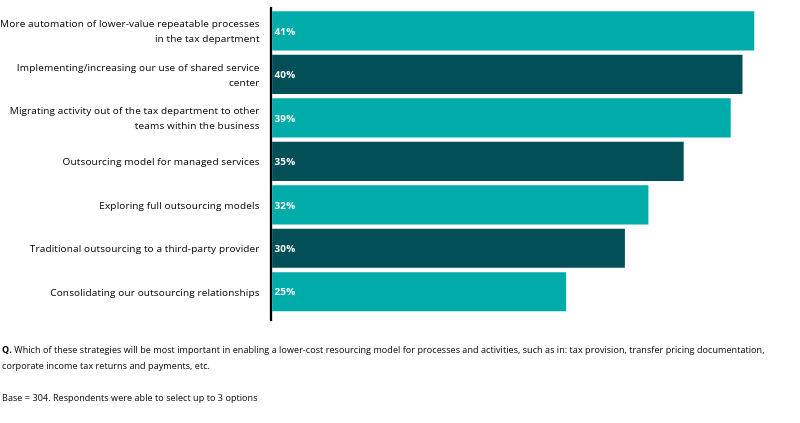
Tax leaders are prioritizing these strategies to help their teams manage compliance workloads
Q. Which of these strategies will be most important in enabling a lower-cost resourcing model for processes and activities, such as in: tax provision, transfer pricing documentation, corporate income tax returns and payments, etc.
Base = 304. Respondents were able to select up to 3 options
Key insight 2: Tax workforce
How has the talent mix changed?
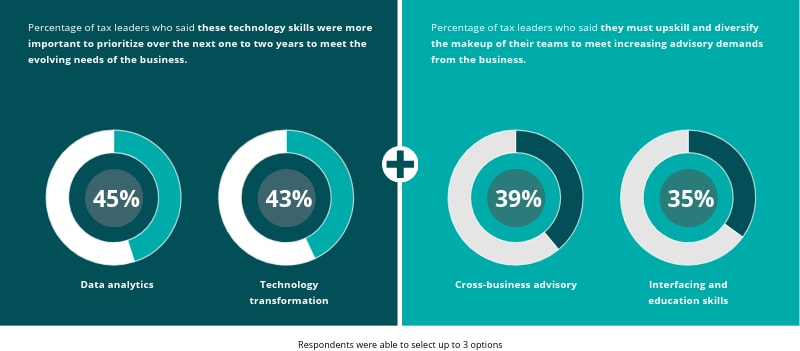
Key insight 2: Tax workforce
Tax leaders recognize that their teams need entirely new technical skills, with data analytics (45%) and technology transformation (43%) at the top of their wish lists. However, these team members also need to flex their cross-business advisory (39%) and interfacing and education (35%) skills. This means they must upskill and diversify the roles on their teams to meet increasing business advisory demands.
What companies are looking for is a beautiful unicorn who knows everything about tax and everything about technology.
Tim Rupert, Professor of Accounting at Northeastern University
The future of the tax workforce
The elusive tax unicorn
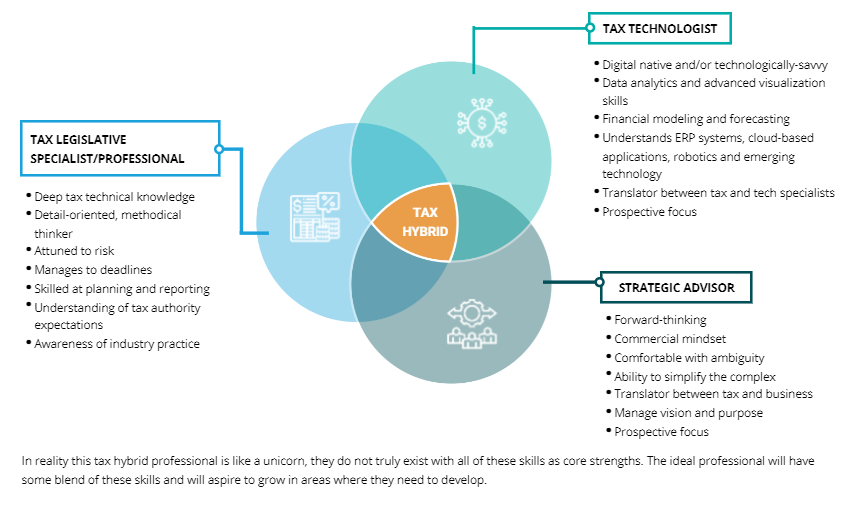
The future of the tax workforce
Developing more tax hybrid professionals means that tax and finance leaders need to think much differently when it comes to recruiting and professional development. The ideal professional will have a blend of these skills and will aspire to grow in areas where they need to develop.
TAX LEGISLATIVE SPECIALIST/PROFESSIONAL
Deep tax technical knowledge
Detail-oriented, methodical thinker
Attuned to risk
Manages to deadlines
Skilled at planning and reporting
Understanding of tax authority expectations
- Awareness of industry practice
TAX TECHNOLOGIST
Digital native and/or technologically-savvy
Data analytics and advanced visualization skills
Financial modeling and forecasting
Understands ERP systems, cloud-based applications, robotics and emerging technology
Translator between tax and tech specialists
Prospective focus
STRATEGIC ADVISOR
Forward-thinking
Commercial mindset
Comfortable with ambiguity
Ability to simplify the complex
Translator between tax and business
Manage vision and purpose
Prospective focus
In reality this tax hybrid professional is like a unicorn, they do not truly exist with all of these skills as core strengths. The ideal professional will have some blend of these skills and will aspire to grow in areas where they need to develop.
You need to go and hire [the data and technology specialists], but it will take time for them to become productive. And the best thing to do, in my view, is to partner them with business analysts who understand banking and the business lines, because it’s when they start to talk the same language that you get the real lift.
Global Head of Tax, A global bank
Power pairings
Whichever route companies take to develop hybrid tax-technology professionals, it will take time. But few tax leaders can wait two or more years for this—their digital challenges are urgent. So, some are doing the next best thing: pairing technology specialists with business analysts or other specialists in the wider finance team to combine their expertise on specific projects.
Examples of pairings that work:
- Internal technology specialists with business analysts or others in finance.
- In-house tax specialists with tax-technology specialists from consulting firms experienced in technology transformation.
- Junior staff with analytics and software licenses. They are digital natives who frequently have been introduced to data analytics and other technologies in university programs. They are able to bring more value when given the tools and opportunity.
Key Insight 3: Tax workplace
Organizational and cultural shifts for the tax department
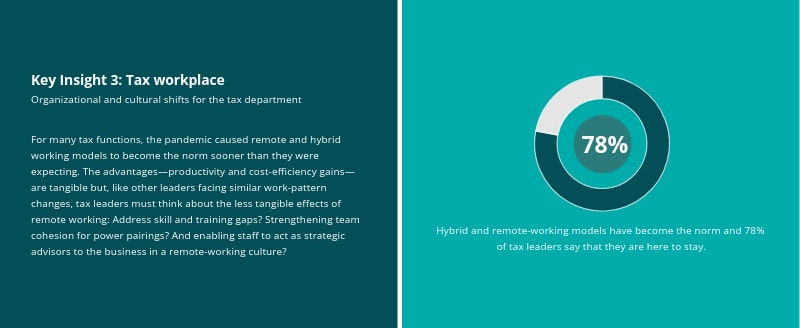
Key Insight 3: Tax workplace
For many tax functions, the pandemic caused remote and hybrid working models to become the norm sooner than they were expecting. The advantages—productivity and cost-efficiency gains—are tangible but, like other leaders facing similar work-pattern changes, tax leaders must think about the less tangible effects of remote working: Address skill and training gaps? Strengthening team cohesion for power pairings? And enabling staff to act as strategic advisors to the business in a remote-working culture?
You need to ensure that you don’t end up with the remote workforce becoming a disadvantaged employee group. There needs to be clarity about how they get visibility for strong performance and how opportunities and promotions are decided upon, among other things. You need to fully address these issues directly and transparently, and not just write them into corporate policy and hope that’s enough to effectively manage such a culture change.
Mike Munoz, VP Tax and Treasurer, Suncor
The main challenges of remote working for the tax department
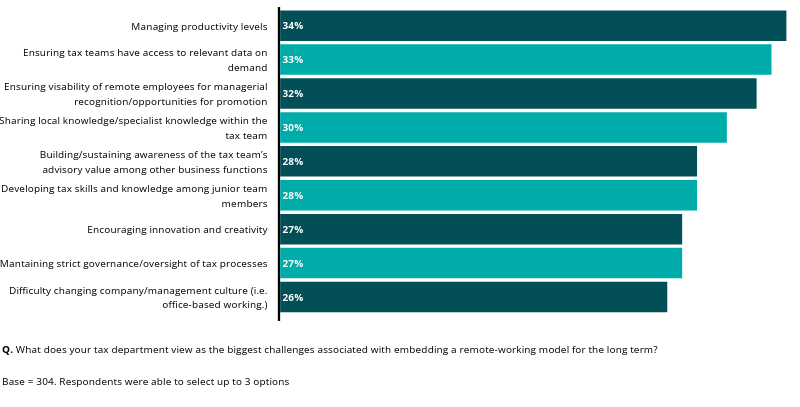
The main challenges of remote working for the tax department
Q. What does your tax department view as the biggest challenges associated with embedding a remote-working model for the long term?
Base = 304. Respondents were able to select up to 3 options
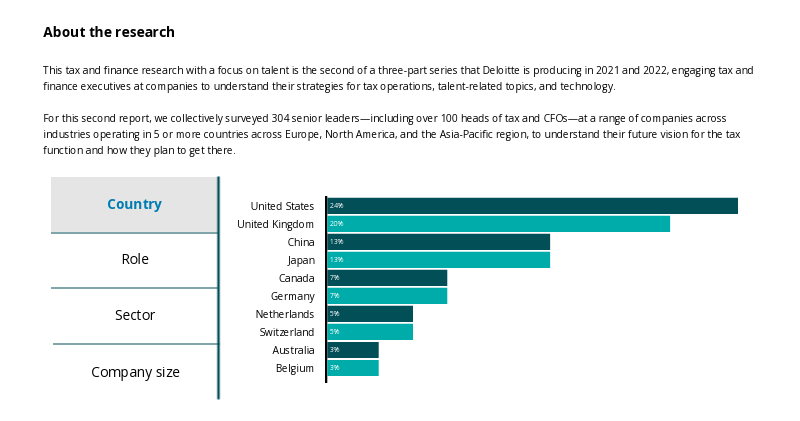
A new paradigm for tax talent
The tax function as we’ve known it is becoming a thing of the past. For tax function leaders, it is essential to build tax teams that meet the evolving demands that the business requires—in a time where the nature of tax work is changing. It is no longer enough to be a master of one or in multiple areas of tax. Professionals must also move out of their previous comfort zones to engage systematically and strategically with other parts of the business to provide the tax advisory expertise needed. They need to think hard today about the what, the who, and the where of their tax operating model and how they will find and develop the people to deliver on the function’s elevated objectives. Many of the tax leaders taking part in our research are doing just that—and in several ways.
Operate with dynamic control in tax and finance
Explore the full report results for the Deloitte tax operations in focus study, the first of our Tax transformation trends survey series.
Tax is leaving the tax department. We’re being pulled much closer into areas such as government relations and sustainability—it’s changing the balance of responsibilities for our team.
Mike Munoz, VP Tax and Treasurer, Suncor
Continue Exploring
how to Operate with Dynamic Control within your tax and finance departments








